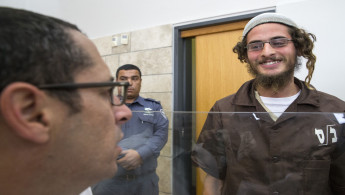Jewish terror groups: A history of escaping justice
Jewish terror groups: A history of escaping justice
Jewish terrorist groups are not a new phenomenon. They have existed before the establishment of the Zionist state, and have since enjoyed an indulgent treatment from Israeli occupation authorities.
4 min read
A slap on the wrist is all Jewish terrorists receive [AFP]
Since well before the official birth of the Zionist state and the occupation of Palestine, numerous Jewish terrorist groups have targeted Palestinians have appeared, with the Price Tag group, the cell that murdered Palestinian toddler Ali Dawabsheh and his father in an arson attack, being the most recent abhornet example of this.
Most of these terrorist groups have employed the tactic of secretive cells, whereby one cell does not know about another, making the task of investigating them and foiling their attacks very difficult.
This tactic is still utilized by Jewish terrorist groups and the Israeli internal security agency, Shin Bet, has used it as an excuse in not pursuing these groups more seriously.
In what follows, we have compiled a list of the main Jewish terrorist groups who have carried out attacks against Palestinians and gotten away with murder.
The Jewish Underground
In June 1980, a Jewish terrorist group known as The Jewish Underground carried out a series of bomb attacks against three Palestinian mayors from the West Bank, who narrowly escaped death but sustained serious injuries.
In 1983, two members of the Jewish Underground entered the Islamic College of Hebron and opened fire on students and tossed a grenade, murdering three students and wounding 33 others. The group had also plotted to bomb the al-Aqsa Mosque in Jerusalem.
In April 1984, the Shin Bet arrested a number of Jewish Underground members who were caught planting bombs under six Palestinian owned buses in Jerusalem.
Three members of the group were finally sentenced to life imprisonment for their role in the attacks against
| Price Tag members set fire to a Palestinian home, killing 18-month-old toddler Ali Dawabsheh, whose father died of his injuries a week later. |
However, the three served less than seven years in prison and were released after the President of Israel at the time, Chaim Herzog granted them pardon.
The TNT group
The TNT or Terror Against Terror group carried out shooting attack against a bus full of Palestinians and a over a dozen grenade attacks against Palestinian churches and mosques in early 1984.
Three members of the TNT group were arrested for the attacks and only sentenced for six years in prison.
The Lifta group
On 27 January 1984, a group three Jewish men who were part of a small clut living in Palestinian homes in the village of Lifta, whose owners were forcibly displaced, snuck into the al-Aqsa Mosque with 28 pounds of explosives and 15 hand grenades, with the intention of blowing up the mosque compound.
The group leader, Shimon Barda stood trail, but it was claimed his two accomplices were not fit to stand trial and were admitted to a psychiatric facility instead.
Barda was sentence to prison in September 1985, however in mid-1988 he escaped from prison and evaded arrest for over a year, by disguising as a bearded Jewish scholar.
In 1990, Israelis authorities announced that they had discovered a huge arms cache that was stolen by Barda from the Israeli army, for a second attempt at the al-Aqsa Mosque, which included shoulder-held missiles.
Bat Ayin Underground
The Bat Ayin Underground is a terrorist group based in the illegal Israeli settlement of Bat Ayin, which in 2001 carried out a number of drive-by shootings targeting Palestinian motorists, killing two and injuring several others.
On 17 September 2001, the group planted two bombs in a schoolyard in the Palestinian city of Yatta in the West Bank, with one timed to explode during recess while the other was timed ten minutes later to maximize causalities, however the first bomb exploded early and the second was defused by the authorities.
The group went on to plant another bomb in a Palestinian school in Sur Baher in March 2002, however students discovered it and covered it with pillows, but it exploded before authorities could arrive, injuring ten children.
When members of the group were finally arrested, they admitted to a string of bombings and drive-by shootings that killed at least eight Palestinians.
Price Tag
In 2008, a string of vandalism attacks against Palestinian property, homes and places of worship started occurring, with the culprits being radical Israeli settlers from illegal settlement in the West Bank.
Palestinian victims called upon Israeli authorities to consider the incidents as terrorist attacks, however their calls fell on deaf ears, and the various acts of violence and vandalism went unresolved.
Many Palestinians believe that the leniency with which Israeli authorities dealt with Price Tag attacks is what lead to the brutal attack on the Palestinian village of Duma, where Price Tag group members set fire to a Palestinian home, killing 18-month-old toddler Ali Dawabsheh, whose father died of his injuries a week later.
This is by no means an exhaustive list of Jewish terrorist groups and attacks against Palestinians, which are always treated leniently by Israeli authorities, to the point of getting away with murder.



